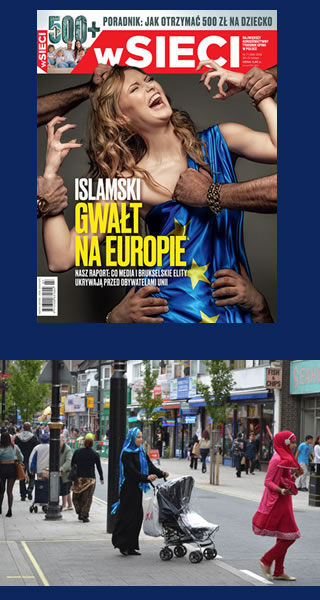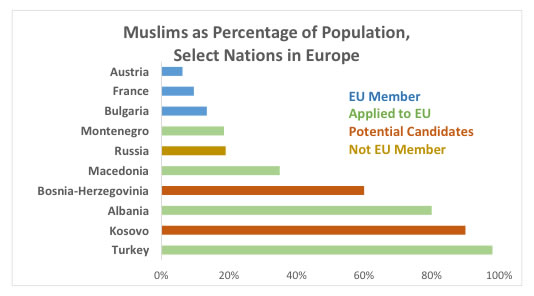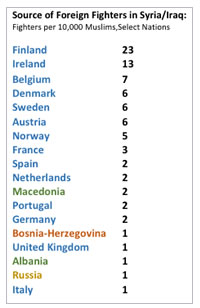Whisper It Softly: Muslims Are Part of Europe’s Future
Whisper It Softly: Muslims Are Part of Europe's Future

BRUSSELS: A specter is haunting Europe – the specter of Islam. Fear has reached new heights, pushed by rising concerns about terrorism and the flow of refugees. Nothing illustrates the fear more than the recent cover of Poland’s popular weekly magazine WSieci, warning of the "Islamic Rape of Europe," complete with a graphic depiction of a screaming blonde woman, with eyes closed, draped in the European Union flag. Three sets of brown and black hands claw at the flag and her hair.
The illustration may be among most shocking of the many images and articles analyzing Europe's ongoing refugee crisis, but the sentiments reflect generalized prejudices and stereotypes associated with Islam throughout Europe. The magazine also offers harsh words for German Chancellor Angela Merkel, accusing her of allowing Muslim refugees from Syria and Iraq to "shock and undermine" European culture and civilization. The anti-Islam lobby and critics of Merkel are having a field day as European governments stumble under the weight of managing the sudden arrival of a million or more refugees. Far right groups and many eastern European leaders rant against Islam and the “Muslim invasion,” with some politicians recommending shooting refugees entering illegally or allowing their boats to sink.
The 28-nation bloc is hopelessly divided between those like Merkel who feel that Europe has a moral duty to help those fleeing war and terror and leaders in eastern and central Europe who build fences and walls to keep the refugees out. Europe’s cities, civil societies, universities and businesses do their best to welcome the refugees, but are drowned out by the rage against the destruction of European values and clamor for tough actions that are often impractical – like sending all Muslims back “home.” Fierce, often hysterical debates leave little space for intelligent arguments and have little to do with the reality of 21st century Europe.
The crisis is stretching economic resources, radicalizing politics and straining political institutions. Fear is spreading as mainstream political parties emulate the strident anti-refugee and anti-migration rhetoric of the far right for an increasingly toxic debate. It need not be so.
The truth is simple, and Europeans have little choice: Islam has long been part of Europe and will continue to be so in the years to come. Throughout history, Europe has never been a fenced-in land. Islamic Spain was a multicultural mix of Muslims, Christians and Jews, and since the Ottoman Empire’s expansion into Europe, parts of the Balkans continue to have large populations of native, European Muslims. A new wave of Muslims from North Africa, Turkey and South Asia has arrived in Western Europe since the 1960s.
Despite shrill headlines of a clash of cultures, Europe is home to about 44 million Muslims, of which 19 million live in the 28 European Union countries. Muslims represent 8 percent of the population in France, 6 percent in Germany, 5 percent in Great Britain.
Europeans must come to terms with Islam and Muslims.
Muslims, also, whatever their origin and sectarian affiliations, must get used to regarding Europe as their home, if they are to have fulfilling and productive lives. Many do so already, and so will most of the refugees settling in to new lives.
The majority of European Muslims are law-abiding citizens who pay taxes and, according to the Open Society Institute, share the same concerns, needs and experiences as non-Muslims, including the quest for a “better quality of education, improved housing, cleaner streets and [the tackling of ] anti-social behaviour and crime.” Moreover, the institute adds that despite the populist rhetoric, an overwhelming majority of Muslims in France and Germany describe themselves as loyal to their country and see no contradiction between French/German and Muslim values.
Germany’s Bertelsmann Foundation notes that Muslims in Germany “feel closely connected” to the country and support “fundamental values” of German society, adding “There is no evidence supporting the common contention that Muslims are living in a separate, parallel society.” Muslim populations are concentrated in cities, and Muslims in France, the United Kingdom and elsewhere in Europe post higher rates of unemployment with many struggling to find work.

Europe’s focus is on Muslims as terrorists, refugees, foreign fighters, criminals and misfits, but these represent a minuscule minority of European Muslims.
The process of adaptation, accommodation, integration, of Europe and Islam is well underway. Children of migrants engage in politics, including Sajid Javid, Britain’s business secretary, and Sadiq Khan, candidate for mayor of London. At least 11 members of the European Parliament have a Muslim family background.
Across Europe, migrant entrepreneurs are revitalizing impoverished urban neighborhoods, creating jobs and prompting innovation. Migrants “contribute to the economic growth of their local area, often rejuvenate neglected crafts and trades and increasingly participate in the provision of value-added services” and “and form an important bridge to global markets,” notes a report by the European Economic and Social Committee.
The economy demands such integration. As European economies stagnate, an aging society needs migrants, skilled and unskilled, to pay taxes and do work that citizens may not want to do. Diversity brought about by migration can be a competitive advantage and a source of dynamism for economies.
Such arguments deserve a hearing. Europe must conduct a sensible conversation on refugees, migrants and Islam which includes arguments with a civil tone, backed by facts. People must move from talking about “us” and “them” to a more inclusive language of living in a shared space, with shared concerns, interests and values.
The conversation must underline that living together means abiding by certain ground rules. Integration is a two-way street, requiring adjustment efforts by migrants and host societies. Newcomers must live according to existing rules and values so that they can become active citizens. The European Commission’s “Integration Handbook” points to the need to learn the host society’s language, history and institutions as “indispensable” to integration. Germany, Norway and other countries are giving refugees lessons on how to treat women and gay people as well as be accepted as full-fledged members of society
The discussion must be inclusive. Such civil conversation requires tackling concerns over economic effects of migration on families, jobs and communities while confronting both pressures and benefits that refugees and migration bring. Extremists cannot be allowed to hijack a debate that concerns all Europeans.
The stakes are high: Europe’s global reputation and hopes of playing a stronger international role depends on its internal conduct and policies. The tone and content of the debate have repercussions on Europe’s internal cohesion and economic dynamism, but also impact EU foreign policy and international standing.

The environment is more favorable to a changed approach than many assume. Tragedies in Paris and elsewhere as well as the focus on foreign fighters who have joined the Islamic State in Syria highlight the disaffection felt by many young Europeans of Muslim descent.
Europe’s single-minded security-focused approach to deal with Muslims is being replaced by a more balanced view that includes an integration agenda and migrant outreach programs.
Governments and businesses are gradually adjusting recruitment policies to increase employment of migrants. For their part, migrant groups are becoming more active as citizens.
But people with migrant backgrounds remain under-represented in national governments and EU institutions, and some form of affirmative action with support for minorities in higher education, recruitment and job promotion may be needed.
The crisis offers opportunity for profound transformation and renewal. It’s true that Europe will never be the same again – and it could be better.
Shada Islam is director of policy at Friends of Europe, a leading European think-tank that aims to stimulate new thinking on global and European issues. Shada is a former correspondent of the Far Eastern Economic Review.
Comments
I imagine you haven't lived in a Muslim majority area in Europe then.
I have.
Once the Muslim population reaches a certain level, they stop being polite and start becoming insular and resentful of the country in which they live.
Europe has no future if this is allowed to continue.
It may already be too late.